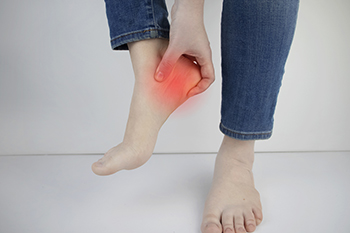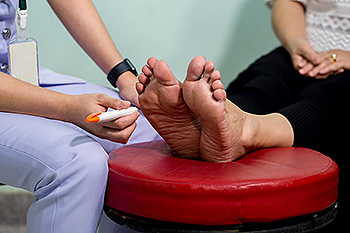Connect With Us
Blog
Items filtered by date: February 2022
Arthritis Can Cause Pain in the Feet and Ankles
What Can Be Done About Intoeing in My Child?
Most babies are born with feet that point either straight ahead or slightly outward, but a few have feet that turn inward, called intoeing or “pigeon-toed.” The cause may simply be hereditary or from a lack of space in the womb that curved the feet. The most common cause is called internal tibial torsion, when the leg bone is twisted inward. Another cause, excess femoral anteversion, occurs when the thigh bone twists inward. Neither condition is painful. A third cause, metatarsus adductus, is also when the toe points inward. Several braces are available to help straighten your child’s feet, but in many cases children’s feet will simply straighten out as they get older. However, if your child has difficulty standing, walking, or running, it’s a good idea to have a podiatrist conduct a thorough examination and possibly take X-rays, to determine the cause and available treatment options.
Making sure that your children maintain good foot health is very important as they grow. If you have any questions, contact one of our podiatrists of Comprehensive Foot & Ankle Centers. Our doctors can provide the care you need to keep you pain-free and on your feet.
Keeping Children's Feet Healthy
Having healthy feet during childhood can help prevent medical problems later in life, namely in the back and legs. As children grow, their feet require different types of care. Here are some things to consider...
Although babies do not walk yet, it is still very important to take care of their feet.
Avoid putting tight shoes or socks on his or her feet.
Allow the baby to stretch and kick his or her feet to feel comfortable.
As a toddler, kids are now on the move and begin to develop differently. At this age, toddlers are getting a feel for walking, so don’t be alarmed if your toddler is unsteady or ‘walks funny’.
As your child gets older, it is important to teach them how to take care of their feet.
Show them proper hygiene to prevent infections such as fungus.
Be watchful for any pain or injury.
Have all injuries checked by a doctor as soon as possible.
Comfortable, protective shoes should always be worn, especially at play.
If you have any questions please feel free to contact our offices located in Shepherdsville and Louisville, KY . We offer the newest diagnostic and treatment technologies for all your foot and ankle needs.
Rheumatoid Arthritis May Be Causing Your Ankle Pain
 Ankle pain can sometimes be caused by rheumatoid arthritis (RA). This autoimmune disease which attacks healthy tissue can often start in the joints of the feet and ankles. When RA attacks the lining in the ankle joint, it becomes inflamed and damaged, along with ligaments and cartilage surrounding the joint. Over time, this deterioration weakens the bones of the ankle, causing them to rub together. This can cause pain in the ankle (which worsens as the disease progresses), stiffness, inflammation, difficulty standing, tenderness, redness and warmth, lack of balance, and more. People with RA in their ankles may also develop corns and bunions, hammertoes, bursitis, pain in the ball of their foot, a collapsed arch, and the shape of their foot may change. Symptoms outside of the feet include a loss of appetite and weight, low grade fever, fatigue, and weakness in the muscles. Genetics, obesity, and smoking can increase your risk of getting RA. If you are experiencing ankle pain, make an appointment with a podiatrist as soon as possible. Along with a physical examination and review of your medical history, your podiatrist may need blood tests, X-rays, ultrasounds, and MRIs to properly diagnose RA and begin a course of treatment to slow its progression and help manage its symptoms.
Ankle pain can sometimes be caused by rheumatoid arthritis (RA). This autoimmune disease which attacks healthy tissue can often start in the joints of the feet and ankles. When RA attacks the lining in the ankle joint, it becomes inflamed and damaged, along with ligaments and cartilage surrounding the joint. Over time, this deterioration weakens the bones of the ankle, causing them to rub together. This can cause pain in the ankle (which worsens as the disease progresses), stiffness, inflammation, difficulty standing, tenderness, redness and warmth, lack of balance, and more. People with RA in their ankles may also develop corns and bunions, hammertoes, bursitis, pain in the ball of their foot, a collapsed arch, and the shape of their foot may change. Symptoms outside of the feet include a loss of appetite and weight, low grade fever, fatigue, and weakness in the muscles. Genetics, obesity, and smoking can increase your risk of getting RA. If you are experiencing ankle pain, make an appointment with a podiatrist as soon as possible. Along with a physical examination and review of your medical history, your podiatrist may need blood tests, X-rays, ultrasounds, and MRIs to properly diagnose RA and begin a course of treatment to slow its progression and help manage its symptoms.
Because RA affects more than just your joints, including the joints in your feet and ankles, it is important to seek early diagnosis from your podiatrist if you feel like the pain in your feet might be caused by RA. For more information, contact one of our podiatrists of Comprehensive Foot & Ankle Centers. Our doctors will assist you with all of your podiatric concerns.
What Is Rheumatoid Arthritis?
Rheumatoid Arthritis (RA) is an autoimmune disorder in which the body’s own immune system attacks the membranes surrounding the joints. Inflammation of the lining and eventually the destruction of the joint’s cartilage and bone occur, causing severe pain and immobility.
Rheumatoid Arthritis of the Feet
Although RA usually attacks multiple bones and joints throughout the entire body, almost 90 percent of cases result in pain in the foot or ankle area.
Symptoms
- Swelling and pain in the feet
- Stiffness in the feet
- Pain on the ball or sole of feet
- Joint shift and deformation
Diagnosis
Quick diagnosis of RA in the feet is important so that the podiatrist can treat the area effectively. Your doctor will ask you about your medical history, occupation, and lifestyle to determine the origin of the condition. Rheumatoid Factor tests help to determine if someone is affected by the disease.
If you have any questions please feel free to contact our offices located in Shepherdsville and Louisville, KY . We offer the newest diagnostic and treatment technologies for all your foot and ankle needs.
Plantar Fasciitis: An Unusual Name for a Common Problem
Although the term plantar fasciitis sounds unusual, the condition it describes is the most common form of heel pain. “Plantar” has to do with the sole of the foot, while “fascia” is a fibrous band of tissue. “Itis” is a suffix used to indicate inflammation. Put those three things together and you are describing an inflammation of the fibrous tissue on the sole of the foot — otherwise known as plantar fasciitis. It can cause a stabbing pain near the heel, which is worst in the morning as you take your first steps, or after periods of rest. This pain can subside as your feet become warmed up. Although runners often develop plantar fasciitis, it can also be common in people who are obese or who wear shoes without adequate support. If you believe you have plantar fasciitis, it is a good idea to contact a podiatrist right away to receive an accurate diagnosis and begin proper treatment as soon as possible.
Plantar fasciitis can be very painful and inconvenient. If you are experiencing heel pain or symptoms of plantar fasciitis, contact one of our podiatrists from Comprehensive Foot & Ankle Centers. Our doctors can provide the care you need to keep you pain-free and on your feet.
What Is Plantar Fasciitis?
Plantar fasciitis is the inflammation of the thick band of tissue that runs along the bottom of your foot, known as the plantar fascia, and causes mild to severe heel pain.
What Causes Plantar Fasciitis?
- Excessive running
- Non-supportive shoes
- Overpronation
- Repeated stretching and tearing of the plantar fascia
How Can It Be Treated?
- Conservative measures – anti-inflammatories, ice packs, stretching exercises, physical therapy, orthotic devices
- Shockwave therapy – sound waves are sent to the affected area to facilitate healing and are usually used for chronic cases of plantar fasciitis
- Surgery – usually only used as a last resort when all else fails. The plantar fascia can be surgically detached from the heel
While very treatable, plantar fasciitis is definitely not something that should be ignored. Especially in severe cases, speaking to your doctor right away is highly recommended to avoid complications and severe heel pain. Your podiatrist can work with you to provide the appropriate treatment options tailored to your condition.
If you have any questions please feel free to contact our offices located in Shepherdsville and Louisville, KY . We offer the newest diagnostic and treatment technologies for all your foot and ankle needs.
Treating Peripheral Neuropathy
Peripheral neuropathy occurs when nerves in the extremities become damaged and dysfunctional. Peripheral neuropathy can cause numbness, tingling, burning/shooting pains and muscle weakness in the feet, along with cramps, swelling, sensitivity, and a loss of coordination and balance. This condition often makes it difficult for people to walk. Peripheral neuropathy is often caused by the elevated sugar levels associated with diabetes, but may also occur due to viral infections, injury, or as a side effect of taking certain medications or indulging in too much alcohol. A podiatrist can help treat peripheral neuropathy through pharmaceutical and physical therapy, custom orthotics for your shoes, or even nerve stimulation treatments. It is suggested that you call a podiatrist to explore treatment options for your peripheral neuropathy.
Neuropathy
Neuropathy can be a potentially serious condition, especially if it is left undiagnosed. If you have any concerns that you may be experiencing nerve loss in your feet, consult with one of our podiatrists from Comprehensive Foot & Ankle Centers. Our doctors will assess your condition and provide you with quality foot and ankle treatment for neuropathy.
What Is Neuropathy?
Neuropathy is a condition that leads to damage to the nerves in the body. Peripheral neuropathy, or neuropathy that affects your peripheral nervous system, usually occurs in the feet. Neuropathy can be triggered by a number of different causes. Such causes include diabetes, infections, cancers, disorders, and toxic substances.
Symptoms of Neuropathy Include:
- Numbness
- Sensation loss
- Prickling and tingling sensations
- Throbbing, freezing, burning pains
- Muscle weakness
Those with diabetes are at serious risk due to being unable to feel an ulcer on their feet. Diabetics usually also suffer from poor blood circulation. This can lead to the wound not healing, infections occurring, and the limb may have to be amputated.
Treatment
To treat neuropathy in the foot, podiatrists will first diagnose the cause of the neuropathy. Figuring out the underlying cause of the neuropathy will allow the podiatrist to prescribe the best treatment, whether it be caused by diabetes, toxic substance exposure, infection, etc. If the nerve has not died, then it’s possible that sensation may be able to return to the foot.
Pain medication may be issued for pain. Electrical nerve stimulation can be used to stimulate nerves. If the neuropathy is caused from pressure on the nerves, then surgery may be necessary.
If you have any questions, please feel free to contact our offices located in Shepherdsville and Louisville, KY . We offer the newest diagnostic and treatment technologies for all your foot care needs.
Blog Archives
- August 2025
- July 2025
- June 2025
- May 2025
- April 2025
- March 2025
- February 2025
- January 2025
- December 2024
- November 2024
- October 2024
- September 2024
- August 2024
- July 2024
- June 2024
- May 2024
- April 2024
- March 2024
- February 2024
- January 2024
- December 2023
- November 2023
- October 2023
- September 2023
- August 2023
- July 2023
- June 2023
- May 2023
- April 2023
- March 2023
- February 2023
- January 2023
- December 2022
- November 2022
- October 2022
- September 2022
- August 2022
- July 2022
- June 2022
- May 2022
- April 2022
- March 2022
- February 2022
- January 2022
- December 2021
- November 2021
- October 2021
- September 2021
- August 2021
- July 2021
- June 2021
- May 2021
- April 2021
- February 2021
- January 2021
- December 2020




